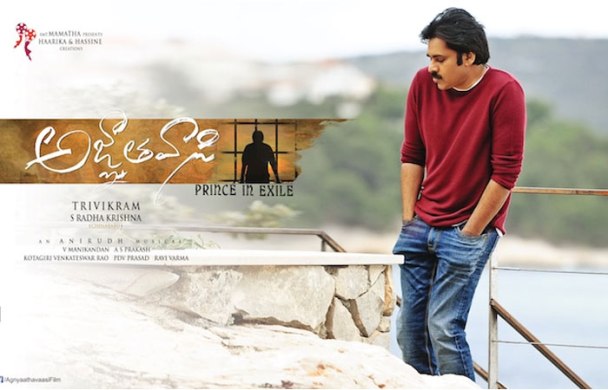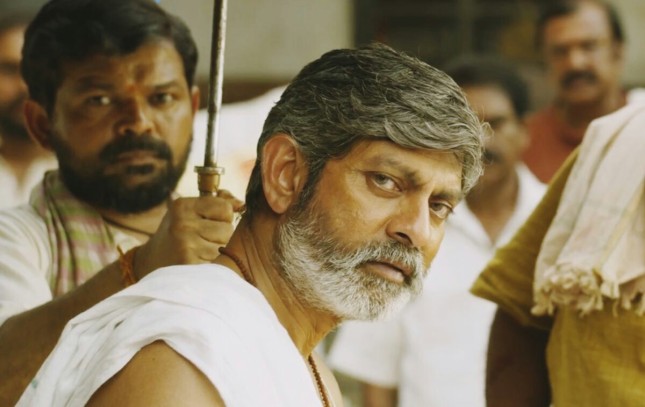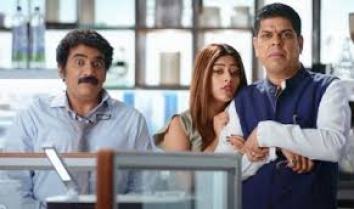Sukumar’s Rangasthalam is a sprawling rural epic set in the 80s and chock full of plot. There’s probably enough for two films, but despite being 80s influenced in running time too, I found it highly engaging.
Tag Archives: Aadhi Pinisetty
Agnyaathavaasi
 Despite a stellar cast and a rocking soundtrack, Agynyaathavaasi turns out to be a rather disappointing watch. Trivikram takes an interesting plot and fills it chock full of masala, to the extent that the story of a son’s mission to exact vengeance on his father’s killers becomes lost in the morass of comedy, romance and OTT fight scenes. Nothing too much out of the ordinary for a Telugu film then you might think, but there is simply too much of everything here, making Agynyaathavaasi a clutter of confusion instead of the thrilling action film it could have been.
Despite a stellar cast and a rocking soundtrack, Agynyaathavaasi turns out to be a rather disappointing watch. Trivikram takes an interesting plot and fills it chock full of masala, to the extent that the story of a son’s mission to exact vengeance on his father’s killers becomes lost in the morass of comedy, romance and OTT fight scenes. Nothing too much out of the ordinary for a Telugu film then you might think, but there is simply too much of everything here, making Agynyaathavaasi a clutter of confusion instead of the thrilling action film it could have been.
The story (when you can catch a glimpse of it) follows the exploits of Balasubramanyam (aka Abhishikth Bhargav aka Bala aka Abhi!) as he attempts to discover who murdered his father and brother, and then follow through to exact revenge. Abhi (Pawan Kalyan) has been raised in secrecy, allowing his younger half-brother to assume the role of heir to his father Vinda’s pharmaceutical empire. Vinda (Boman Irani) is notorious for always having a Plan B, hence the existence of Abhi who is rather oddly is his step-mother’s favourite, despite his exiled status. Indrani (Khushboo) suspects that her son and husband did not die accidental deaths, and calls Abhi back to discover which of the two aspirants to Vinda’s AB Company were responsible for the deed. Varma (Rao Ramesh) and Sharma (Murali Sharma) have been part of the company since its formation, but neither seem up to the challenge of running a multi-national organisation. Both actors do their best, but with poorly etched characters played mainly for comedic value it’s hard to see why they could ever be in the running as suspects for the murders.
Adding more unnecessary slapstick is Raghu Babu as a particularly sleazy office manager whose antics aren’t even remotely funny and who is completely superfluous to the plot. As too are Abhi’s side-kicks, who start off by offering technical support for his scheme to infiltrate the company but end up as a kind of enthusiastic group of cheer-leaders on the sidelines instead. These include Tanikella Bharani as Abhi’s uncle, Srinivasa Reddy and Abhishek Maharshi who all gasp, cringe and applaud at appropriate moments but otherwise have little to do as Abhi smoothly goes about his investigation without encountering too many problems.
Naturally there has to be a romance – so why not two? Anu Emmanuel and Keerthy Suresh are the two women Abhi uses as part of his schemes to discover the truth, which goes some way to explaining the mainly superficial nature of the relationships. Still it does mean a couple of songs and a quick jaunt to Bulgaria in between Abhi’s many fight scenes. Outside of this though, the two actors only appear as light relief in between beautifully staged but surprisingly dull fight scenes.
Normally the saving grace in these films is the performances of the actors, but almost everyone here, including Pawan Kalyan overact like crazy. The Powerstar doesn’t seem engaged with the screenplay at all for most of the film – not surprisingly perhaps, since I found it difficult to engage with too! There’s a bizarre scene where an insightful police officer (Sampath Raj) starts to postulate on who Abhi could possibly be, and manages to reconstruct the entire sequence of events without any clues, witnesses or evidence to back up his theory! It’s another example of needless frills that hinder the story. A flashback sequence would have worked much better and there was no need to add such speculation, particularly when the police officer involved reported that both Vinda and his son died by accident despite Vinda being shot in the head before he plunged to his death from a high-rise.
On the plus side, the music from Anirudh Ravichandler is excellent and suits both the action and romantic sections of the screenplay. The songs are also catchy, but for the most part don’t sit well within the screenplay and most seem to be added rather randomly. Despite this, the choreography is excellent and the locations beautifully filmed. Indeed, overall the cinematography is excellent with some stunning shots of Varanasi near the start of the film. I also liked the attempt to link Abhi’s story to parts of the Mahabharata and the story of Krishna, which helped to fill in some of the back-story that was glossed over rather quickly.
There are some terrific performances too in the midst of all the general scenery chewing. Boman Irani is good and Khushboo is notable in her return to the big screen as Abhi’s step-mother and Vinda’s widow. She’s compelling in her scenes and her understated performance stands out in the midst of all the other melodrama. Also very good is Aadhi Pinisetty as the main protagonist, Seetharam. He gets the balance between arrogant brat and murdering megalomaniac just right while looking dapper and well-groomed at every occasion. Despite only a short amount of screentime Aadhi is impressive and makes an excellent villain once again.
Agynyaathavaasi is simply too uneven to be anything other than a one-time watch. Although there is a good basic storyline, the added fluff and masala buries it too deep and not even the excellent production values can keep it from sinking under all that weight. Although Khushboo and Aadhi along with Anirudh’s music and V. Manikandan’s cinematography are worth seeing, this is really a film best for fans only.
Ninnu Kori
Ninnu Kori had the potential to be good. I like the concept, and it is rare to see a first love is not the only love story. Unfortunately Shiva Nirvana squandered a great cast on a badly written screenplay full of paternalistic BS.
Uma (Nani) meets Pallavi (Nivetha Thomas) when she suddenly decides he must teach her to dance. The moment he touches her, he falls in love. Pallavi takes longer to succumb, and their developing friendship and ensuing romance is among the few highlights. Uma rents the upstairs room at Pallavi’s family home, carrying on a clandestine romance under the eagle eye of her dad (Murali Sharma). Uma seems to have no family, is a PhD student with no job lined up, and he doesn’t seem inclined to try too hard. Pallavi begs him to marry her as while she will elope and upset her parents, she won’t disgrace the whole family by running away after they fix a match. He overhears her father interfering in another family’s elopement issue and the speech about what fathers know their daughters need hits home. Pallavi’s marriage is arranged in Vizag while Uma is studying in Delhi. She calls him in a last ditch attempt, but he talks over her about his own news. So Pallavi marries Arun (Aadhi Pinisetty) who seems nice despite a penchant for Disney songs. They move to the US and life is good. Until Uma turns up determined to “save” Pallavi from what he believes must be a loveless marriage.
The film sounds promising as it acknowledges that it is fine to have a past, and it is OK to move on from an unsuccessful relationship. Sadly almost every time someone made a good or thoughtful point, they then pretty much did the opposite of what they said. When Uma says not to interfere between Arun and Pallavi, the next scene is of Uma and others engineering a confrontation between the spouses.
According to Kona Venkat’s screenplay, under NO circumstances should you ask a woman what is important to her. Men must only ever discuss this with another man, preferably one with his own agenda or, even better, no idea at all. Rather than tell Pallavi the truth, Arun shared an admittedly touching scene with Uma where Uma was forced to realise he was the equivalent of a cocaine fuelled suicidal ex wannabe girlfriend. Several men in the audience applauded while I wondered why Arun couldn’t be honest with his wife but could spill his guts to the guy trying to replace him.
Shiva Nirvana takes all the cheap shots, and none of them necessary. Pallavi’s best friend Kavita had to be a fat chick and the butt of some mean one-liners. Addiction and mental illness were treated flippantly as a now you see it now you don’t excuse for Uma’s shenanigans. A black actor was cast as a knife wielding mugger while most of the other American extras were white.
At the end of the film Uma grandly states he has learned his lesson and will marry first, fall in love after. I have no issue with arranged marriages, but I take exception to the man who behaved like a dick being applauded for deciding to bestow himself upon some poor woman. He constantly put himself first, blamed everyone else if he didn’t get what he wanted, and took advantage of Arun and Pallavi’s kindness. What a catch. What a hero.
Nani is the Simon the Likeable of Telugu cinema and I blame him for making me stay beyond half time. In the first stage of Uma’s love for Pallavi, Nani plays him as a genuine, nice, boy next door type. He is playful and affectionate, and wants to get his degree and a job before marrying Pallavi. Once she marries Arun, Uma becomes an alcoholic which Nani demonstrates by sporting a beard and drinking so hard he almost bites the top off a hipflask. When Uma goes to stay with Arun and Pallavi he is all spite and manipulative snark. His snide remarks got lots of laughs but despite good comedic timing I wanted to kick him. Pallavi tells him she is happy, but Uma knows better. He couldn’t move on, how can she?
Pallavi starts out as a bit daft but eventually, perhaps in spite of the screenplay, Nivetha Thomas develops her character into a lovely young woman. Her grief at their break up and her anger at Uma’s selfishness are portrayed with restraint and judgement. When Pallavi thinks Arun has cheated, Nivetha made the melodrama feel grounded in Pallavi’s previous experience. She had some strong dialogue, and Pallavi was willing and able to articulate her feelings, but the men only listen to themselves. Pallavi was hurt to think that Uma was wallowing in pain because he assumed she was miserable while I was upset that he never listened to her.
Aadhi Pinisetty has a quiet energy that plays off Nani’s more extrovert childish antics. At first I thought Arun was a bit wet, but Aadhi shows the reaction and immediate squashing down of his feelings. He and Nivetha have a different chemistry, convincing as a settled couple. And because husbands are heroes, he also got to beat someone up. I was very distracted by his unfortunate 70s blow wave though. I’m going to blame the director because he bollocksed up so many other things he may as well cop the hair crimes too.
Tanikella Bharani is understated in a small role as Uma’s professor and mentor, in as much as a mentor calls on an ex to sort out his most brilliant student’s life. Balireddy Pruthviraj is Lovababu, Pallavi’s (comedy) uncle. I can’t really fault any of the support actors, except for the usual “any white person will do, especially one in a bikini” extras.
Gopi Sunder’s soundtrack is adequate without being memorable. The background score is hamfisted with crashing percussion to indicate drama, and strings and synths denoting romance. The visual language is clunky, and things that probably sounded cool look amateurish in execution (e.g. Uma splashing water on his face cutting to a crashing wave). There are vague attempts to paper over some plot holes and some very awkward exposition. The pace is uneven, wallowing in Uma’s angst while speeding past pivotal moments.
The film is a mansplainer’s delight and Uma, who behaves appallingly, is constantly rewarded for being an arse. I was disappointed by Ninnu Kori, and don’t recommend it because of the stupidity and toxic messages disguised as respect for tradition and the power of love.







































